❗️We are looking forward to receiving your submissions for the 16th #TWEC Transatlantic Workshop on the Economics of crime. @chtraxler.bsky.social
⏳ Deadline: May 02 - five weeks from today.
See details in the thread below 👇
25.03.2025 07:21 — 👍 14 🔁 11 💬 0 📌 0
📣 We’re hiring! 📣
Join @woessmann.bsky.social and my team at @ifoeducation.bsky.social as a PhD student to conduct super-exciting field experiments in the Economics of Education 🤩🚀
Reach out if you have any questions! 💪🏻🙏🏻
@cesifo.org
21.03.2025 06:21 — 👍 25 🔁 17 💬 0 📌 1

Sky Follower Bridge
Bridge your Twitter/X followers to Bluesky. Detected Users: 257
I've discovered 257 Bluesky users from my social network using the Sky Follower Bridge.✨
Check it out: share.sky-follower-bridge.dev?q=257
#skyfollowerbridge
18.03.2025 08:59 — 👍 4 🔁 0 💬 0 📌 0
The news over the weekend and this morning have been terrifying. I'm dismayed at the total lack of action but I also have no idea how to act. I can't believe I'm watching America as I know it collapse in front of my eyes.
17.03.2025 14:24 — 👍 141 🔁 15 💬 6 📌 3
I have spent more than 13 years of my career at @iza.org Bonn. I was able to climb the in-house career ladder quite a bit: I started as an intern, was then hired as a student helper, and offered an IZA PhD scholarship. Eventually, I became a Senior Research Associate and Team Leader. (1/4)
25.02.2025 08:15 — 👍 16 🔁 1 💬 1 📌 1
I had the opportunity to visit the @cpbnl.bsky.social and present my research on `How Has the Increase in Work from Home Impacted the Parental Division of Labor?´
Thanks for the invitation and great discussions!
I can also very much recommend the 🍻 in NL 😀
08.03.2025 05:54 — 👍 2 🔁 0 💬 0 📌 0

Devastating news that @iza.org is effectively closing down 😔
It was (or at the moment, is) a wonderful institute and the network was tremendously helpful in dissaminating work in labour economics.
IZA will sorely be missed 😢
So sorry for all IZA employees!
24.02.2025 15:36 — 👍 120 🔁 29 💬 7 📌 11
Economists love using linear regression to estimate treatment effects — it turns out that there are perils to this method, but also amazing perks
Come with me in this 🧵 if you want to learn about our now-published paper "Contamination Bias in Linear Regressions!"
1/ (Twitter rerun!)
30.11.2024 12:29 — 👍 413 🔁 129 💬 19 📌 15
Thanks, Ingo! Very helpful 👍
12.11.2024 16:11 — 👍 1 🔁 0 💬 0 📌 0
I created an IZA @iza.org Network Fellows/Affiliates starterpack, starting from those I am following, and who are following me. I surely missed a lot. Please reply below this tweet and tag yourself and your fellow Fellows! #econsky #laboreconomics #econ
go.bsky.app/5NP4VCb
12.11.2024 08:30 — 👍 82 🔁 42 💬 52 📌 2
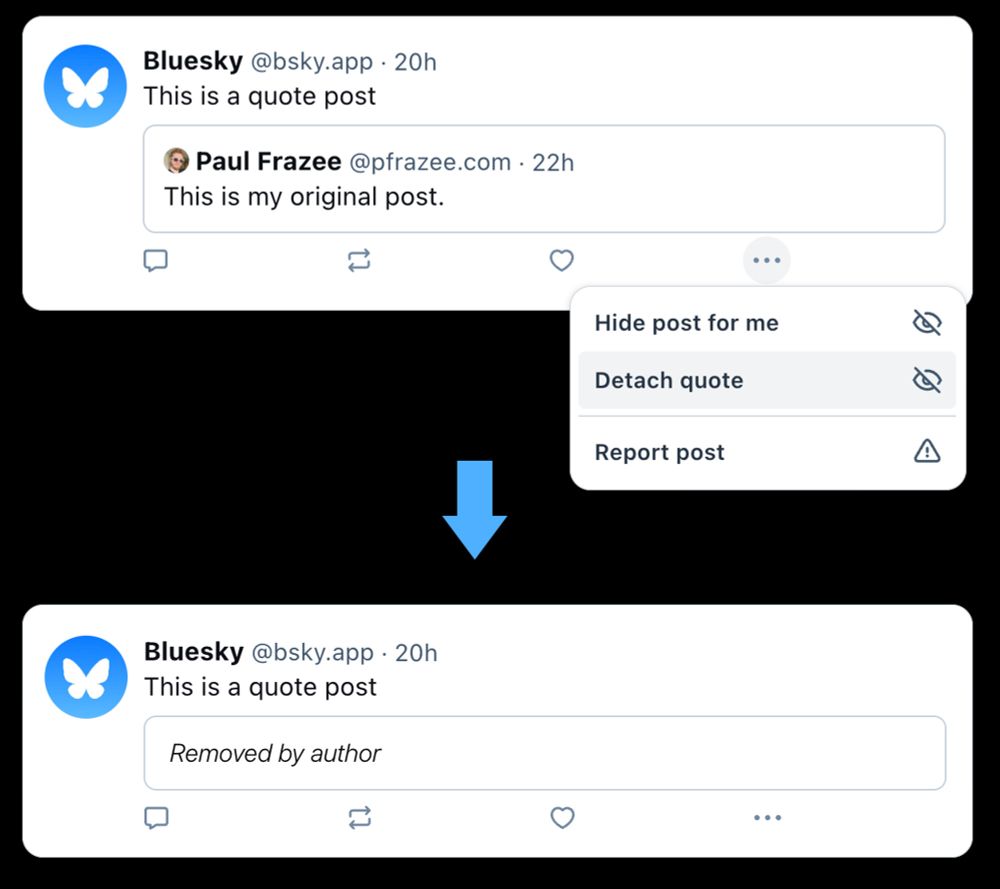
An image showing what I describe
Fun fact: If someone quotes a post of yours in a way that is unwelcome (as is commonplace on Twitter/X) there is a tool to combat the unwanted attention. Simply click the three dot menu on the quote post & click "Detach quote". This removes your post from their quote post. Useful to know, do share!
12.11.2024 14:19 — 👍 19734 🔁 11439 💬 515 📌 1136
I’ve made a Women in Econ starter pack (s/o @vinisingh.bsky.social for sparking the idea!). Share, follow, and comment below if you’d like to be added! go.bsky.app/LqBPkQZ
12.11.2024 13:11 — 👍 454 🔁 217 💬 168 📌 22

Had a nice day at VSE Prague 😊 Great discussions, comments, and food! Thanks for the invitation, Klara Kaliskova 🙌
Had a nice day at VSE Prague 😊 Great discussions, comments, and food! Thanks for the invitation, Klara Kaliskova 🙌
17.10.2024 19:19 — 👍 2 🔁 0 💬 0 📌 0
On my way from Oslo to Bergen for the EALE 🚄
Happy to meet many old and new faces! If you would like to chat, have a beer, or go for a run 🏃, please reach out 👋
04.09.2024 14:40 — 👍 1 🔁 0 💬 0 📌 0
I am very excited to share that I will join University Hamburg in autumn as postdoctoral researcher (collaborating with Iris Kesternich) :tada:
Thank you to everyone who supported me throughout the job market!
06.03.2024 15:40 — 👍 5 🔁 0 💬 0 📌 0
"Even if low-educated women have highest period fertility levels in almost all covered European countries, the educational gradient is not always negative. In 1/3 of countries, fertility in 2010 is U-shaped, with middle-educated having lowest fertility" t.co/mBKslAJ50E
29.11.2023 22:54 — 👍 3 🔁 2 💬 0 📌 0
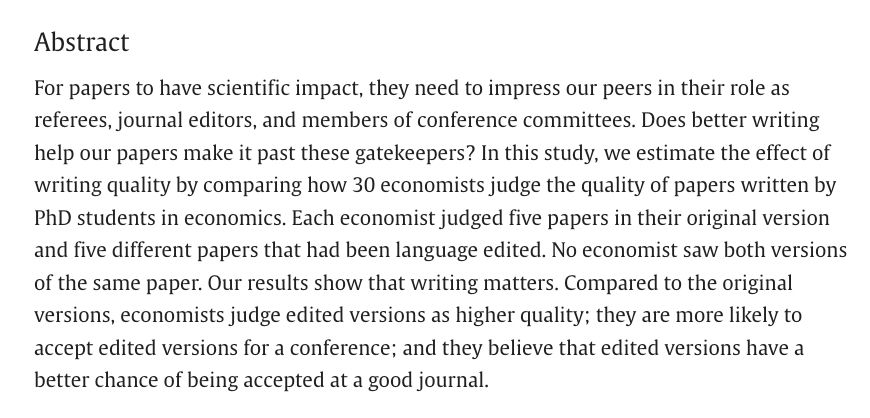
Is better writing rewarded in peer review?
Our newly published suggests the answer is “Yes”!
doi.org/10.1016/j.je...
#EconSky 🧵 (1/7)
27.11.2023 20:26 — 👍 76 🔁 35 💬 5 📌 2
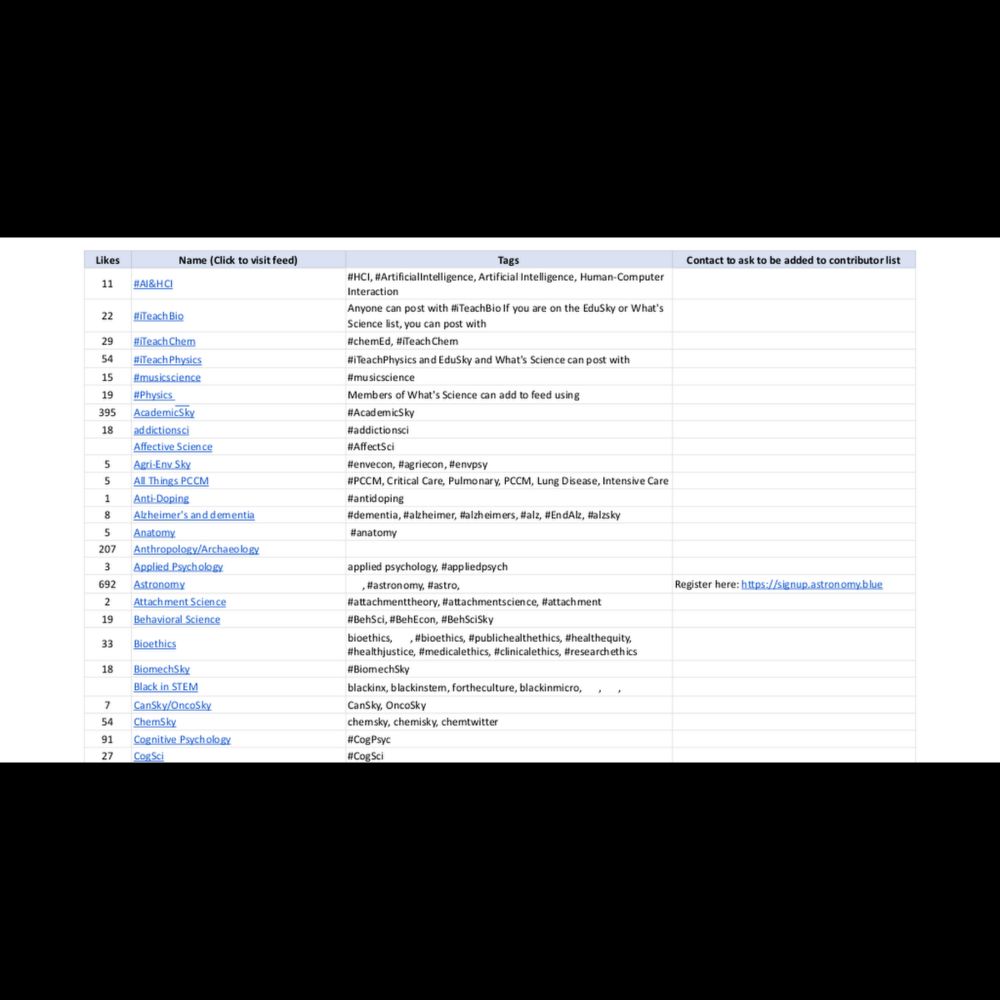
BlueSky Science-Related Feeds
Sheet1
Likes,Name (Click to visit feed),Tags,Contact to ask to be added to contributor list
11,<a href="https://bsky.app/profile/did:plc:ftnzzw4cnon2pzpw7i5m2xu7/feed/aaaiqnkwsgsz6">#AI&HCI</a>,#HCI,...
🧪 Scientist?
🟦 New to BlueSky?
👀 Wanna find posts by other people in your area and use the right hashtags in your own posts?
📃 Here’s a list of around 160 science-related feeds and their hashtags.
#AcademicSky #PhDSky
19.10.2023 06:48 — 👍 242 🔁 161 💬 13 📌 13
Excited to have @cacilialipowski.bsky.social visiting IZA this week.
Check out her excellent Job Market Paper 👇
22.11.2023 16:14 — 👍 1 🔁 0 💬 0 📌 1
My co-author, Tim, took the opportunity to join bsky 👋
Find him here: @mensingertim.bsky.social
21.11.2023 16:14 — 👍 2 🔁 0 💬 0 📌 0
Here is a link to the paper (with many more details): christian-zimpelmann.eu/files/zimpel...
Comments and feedback are very welcome.
Good luck to anybody else on the job market!
21.11.2023 09:56 — 👍 1 🔁 0 💬 2 📌 0
Results of the structural model rely on those open-source software packages:
- Solution of dynamic models: github.com/OpenSourceEc...
- German tax and transfer system: gettsim.readthedocs.io
- Numerical optimization: estimagic.readthedocs.io
- Optimization algorithm: github.com/OpenSourceEc...
21.11.2023 09:55 — 👍 1 🔁 0 💬 1 📌 0
Policy takeaways:
1. As attitudes are important, effectiveness of policies limited in the short run.
2. They need to be considered when extrapolating average policy effects to different contexts.
3. Addressing heterogeneous subpopulations requires targeted policies.
21.11.2023 09:54 — 👍 0 🔁 0 💬 1 📌 0
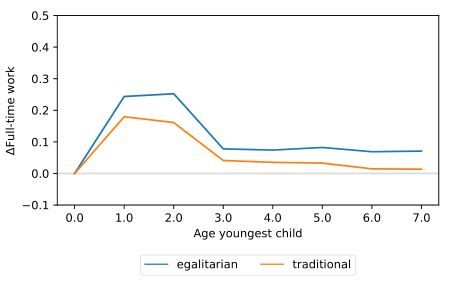
Results:
1. Labor supply elasticities higher for traditional mothers
2. Policy facilitating access to full-time childcare has stronger effect on egalitarian mothers
Implication: if distribution of attitudes changes over time, elasticities and policy effects change, as well
21.11.2023 09:53 — 👍 0 🔁 0 💬 1 📌 0
Second step: Study interaction of gender attitudes with hypothetical policies.
Estimate a structural model of female labor supply.
Elements: Discrete labor supply choice, human capital accumulation, life cycle perspective
Novel feature: heterogeneity by gender role attitudes
21.11.2023 09:53 — 👍 0 🔁 0 💬 1 📌 0
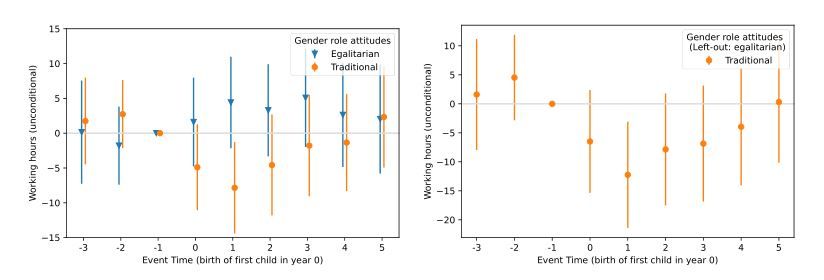
Exploit eligibility-cutoff by birth date of the child
Results:
👉 Traditional mothers reduce labor supply (46% stronger than baseline)
👉 Egalitarian mothers do not reduce labor supply
21.11.2023 09:53 — 👍 0 🔁 0 💬 1 📌 0
Now: Look at interaction with economic incentives using actual and hypothetical policy changes
First step: Study introduction of a cash-for-care policy (`Betreuungsgeld`). Parents receive subsidy if they do not take up public childcare when child is one or two years old.
21.11.2023 09:52 — 👍 0 🔁 0 💬 1 📌 0
Measuring individual-level attitudes allows further analyses:
1. Study relation to background variables (explain only 13% of variation in attitudes) and control for them
2. Attitudes of the father predict maternal labor supply (in addition to mothers' attitudes) 👉 joint household decision
21.11.2023 09:52 — 👍 0 🔁 0 💬 1 📌 0
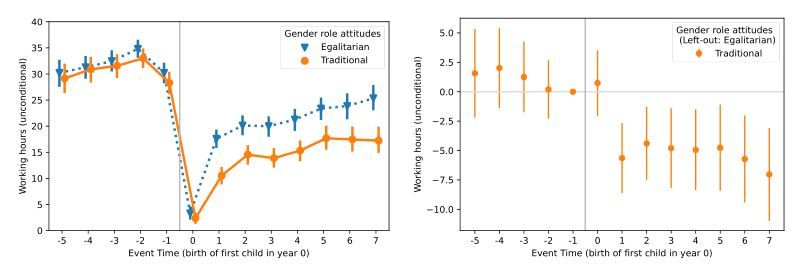
Event studies around birth of the first child:
👉 Pre birth: same labor supply for egalitarian and traditional mothers
👉 Post birth: egalitarians return much faster to the labor market
-> 15% more likely to work, work 4 hours more, persistent effects
21.11.2023 09:51 — 👍 12 🔁 8 💬 1 📌 1
Econ PhD EUI, currently ECB research.
Global Demography, Fertility, Aging, Cognition, Productivity, Religion. Interdisciplinarity.
Professor Columbia & Oslo - PI @theCEFH
https://scholar.google.com/citations?hl=no&user=OZOgxGEAAAAJ&view_op=list_works&sortby=pubdate
.
Researcher @sofi.su.se 🏳️🌈 Econ PhD. Same-sex couples' transition to parenthood. Family policy. Health & earnings impact of gender transition.
The HCHE is a joint research center of the University of Hamburg and the University Medical Center Hamburg-Eppendorf. More than 90 researchers are working on interdisciplinary solutions for current and future questions in the field of health economics.
Independent freelance consultant |
data scientist | data engineer | software developer
#rstats #python #pydata #bash #databs #azure python tools for #powerbi
DMs about freelance projects, collaborations, or just to chat welcome 😁
Data Scientist, Economist, Human
Daten-, Bahn- und sonstiger Verkehr
Head of Virology at Charite - Universitätsmedizin Berlin
Oberbürgermeisterin der Bundesstadt Bonn \ MdB 2009 bis 2020 \ schreibe selbst \ Klimaschutz \ Mobilitätswende \ Zusammenhalt \ Karneval 💚
Climate activist, born 364ppm, based in Berlin
Professor of Economics, U Mannheim, private account=private opinion
— Founder of Our World in Data
— Professor at the University of Oxford
Data to understand global problems and research to make progress against them.
AP @unibocconi - previously @TPRI_BU in Boston and @mpi_inno_comp in Munich. All opinions my own. https://www.felixpoege.eu/
(Last name also as Pöge)
VoxEU – CEPR’s policy portal - promotes "research-based policy analysis and commentary by leading economists". VoxEU columns cover all fields of economics broadly defined and are widely read.
Leiter Politik @freiheitsrechte.org ; Koordiniert Bündnis F5;
Vorher: FES in Asia, Bundestag, Harvard Kennedy & TU Berlin
#Staatsminister im Auswärtigen Amt, Mitglied des Deutschen #Bundestages 2011-2025, BÜNDNIS 90/DIE GRÜNEN, Impressum: https://www.tobias-lindner.de/datenschutz/
Stadträtin München 🥨 | Grüne🌻 | Verkehrswende Radentscheid 🚲 | Feminismus ♀️| Familie 👨👩👧👦 | Redakteurin 📝 | LebenRetten 🚑 | ZdK🐟 | Lyrik✨









